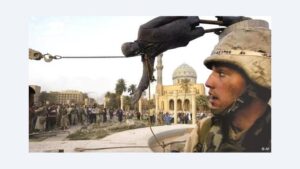You’d think that 20 years after the military invasion that was supposed to bring freedom and prosperity to the country Iraq would be doing great. Alas, that’s not the case. Though it’s true that the country has greater press freedom and open elections, corruption is among the worst in the world. Most of the jobs available are with the government and you have to pay for them or have connections with a sectarian or political group. This means that the Sunnis are largely marginalized and the Shi’a parties compete fiercely with each other.
The quest for Sunni empowerment was the major reason for the growth of ISIS, and today the major Sunni cities, Fallujah and Mosul, are still in shambles from the effort to eradicate ISIS. I went to Iraq almost yearly after the invasion and watched the deterioration from fairly well-maintained modern cities and roads to crumbling infrastructure. Anarchy reigned in the weeks after the invasion and the subsequent squabbles among political contenders has not made governance much better.
The marginalization of Sunni Muslims in the Western region led to the rise of ISIS and a whole new war. In the twenty years since Saddam was toppled hundreds of thousands of Iraqis have perished, and thousands of American soldiers and contract militia also perished. The wounds of the wars remain.
So it is not surprising that many old timers think of life under Saddam as the good old days, as brutal as he was. Almost half of the population is too young to remember Saddam. They only remember the chaos of the American occupation and the corrupt sectarian political fights of the present. Alas, the time is ripe for another ISIS.
Some sectors of the society, however, have prospered post-Saddam. In the Kurdish region in the north, cities such as Erbil, Sulaymaniyah and others are thriving. The Kurds were treated badly by Saddam and they praise the US intervention for giving them a de facto independent state. Some Shi’a parties and their allies are also doing fine.
The big winner, of course, is Iran. It is still amazing to me that the geniuses in the White House and Pentagon at the time of the invasion did not see that coming. The toppling of the Sunni Saddam was a huge gift to Iran. After all, democracy means majority rule, and when sixty percent of the country is Shi’a Muslim, it’s their political parties that will dominate. Shi’a party ties are naturally with their Shi’a neighbor, Iran.
Considering all of the negative consequences of the invasion, why did the US get involved? I thought at the time, and still do, that it had nothing to do with weapons of mass destruction or even control of oil. Rather, remembering an article in the National Review a couple of years before the invasion, there was speculation that Iraq would be a great place for a US air base since Saudi Arabia was becoming increasingly unstable and uncertain regarding the support of the US base there. The US wanted a military anchor in the Middle East to “stabilize” the region and provide support if needed for Israel. One of the first things the US military did in Iraq was indeed to construct a huge air base in the desert.
Saddam was such a cruel dictator the Bush advisors thought that no one would object if he were removed. Besides, the country was largely a secular regime, well-administered, so they thought it would run well without Saddam. What could possibly go wrong?
If it was true that there was always a long-term military goal you’d think more consideration would have been given to the governance of the occupation. At the time I happened to be teaching a class on global conflict with Barbara Bodine, who was an a year’s leave from her State Department duties that included being ambassador to Yemen during the USS Cole attack. She was initially supposed to be in charge of the reconstruction in Baghdad. She spoke Arabic, knew the region well, and I recall that she was full of great ideas about how to work with local groups, reconstitute the military and administration and gain support from neighboring Islamic countries. She was almost immediately ousted, however, in favor of Paul Bremer, who was junior to her in the State Dept, but who was willing to take orders from Pentagon and Cheney.
As we quickly discovered, the geniuses in the Bush administration hadn’t a clue about how to govern Iraq after Saddam. We have all suffered as a result.

